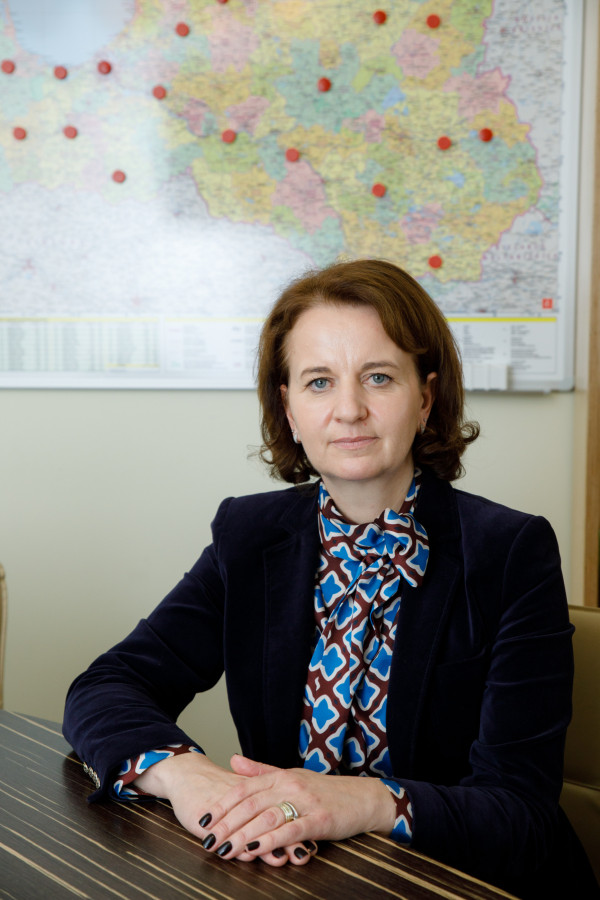How the state helps companies and employees find each other

2020 has already been secured a special place in the history of the State Employment Agency (SEA). Evita Simsone, the agency's director, told Neatkarīgā about the agency's work, experience and plans in the Covid-19 crisis.
The biggest topicality is the virus and everything it has caused around it, - admits E. Simsone. - It has had a huge impact on the labor market and also on the work of our institution. In March and April, more than 20,000 people became our clients and the unemployment rate rose by two percentage points in a short period of time.
In everyday language, it doesn't sound too impressive - a few percent up or down.
Yes, but 20 thousand people is a large enough number of people, concentrated mainly in Riga and Pieriga. This was logical, as the crisis had hit the tourism industry hardest and everything around tourism (carriers, caterers). The second feature was that, on average, more educated people became our clients, the crisis hit a more skilled workforce. The crisis and its effects were not foreseen by anyone before, but now there is no shortage of warnings that this crisis is not the last. At the moment, we are behaving differently than we were behaving in the spring. From mid-June, we are already experiencing a fall in the unemployment rate, and operational statistics confirm it for this week as well, and people are losing their unemployment status because they got a job. Admittedly, the weather was also very favorable this autumn, as the summer jobs continued and in some cases, starting with construction, can continue to this day. This has a positive effect on the labor market and people's chances of being employed.
Do people have access to jobs that do not fully depend on climatic conditions and Latvian state orders for road construction?
Hotel administrators could not retrain en masse as road builders, but the skills of hotel administrators are not so specific that they can be applied to other types of office and administrative work. Of course, the aviation sector was also hit very hard. It was much harder for pilots to find an equivalent job, but their numbers were smaller. Each industry and group of employees is evaluated separately, but our work focuses on helping specific people. It is necessary to look through each person's skills for what could be used at a given moment.
How were such evaluation procedures affected by the transition to remote communication between SEA employees and clients?

Since the state of emergency was lifted, our services have been organized partly remotely and partly in person. In autumn, when the epidemiological situation began to deteriorate again, we urge everyone who can to use remote services again as much as they can. Our employees consult by phone and also communicate by e-mail and on various communication platforms, mostly Zoom. Again, we evaluate each specific case also from the point of view of whether the client is ready to receive the remote service, or whether he still needs a meeting in person. The SEA portal has templates through which people can inform about their education, skills and other characteristics, which should be taken into account when choosing appropriate offers from our own or other public information sources. If they need a CV or cover letter, our staff can help them prepare one. If this is not enough, then we need to look at what support measures are needed. Whether it is social skills training or vocational retraining.
There are still accusations from entrepreneurs that the trainings organized by the SEA do not provide them with the kind of employees they need.
Unfortunately, such myths are perpetuated, although for the last 10 years I can say for sure that the SEA has not provided training that does not meet the current demand for employee qualifications. Employers are happy to talk about the mismatch of the workforce with their needs, but on the other hand, it is a question of how entrepreneurs address potential employees. If a person has acquired a modern education, including outside Latvia, then he will not want to work in a company where it is still required to write a long motivation letter and CV, which must be written on paper and sent by post or, at best, by e-mail. It is absolutely unappealing and off-putting. In our dynamic times, social networking accounts must also be available to attract employees.
Entrepreneurial activity in many cases is aimed at attracting migrant workers and justifying such actions.
In order to employ third-country nationals, their salary must be at least equal to the national average salary, which currently stands at EUR 1,076 per month before tax. Such salaries for migrant workers are paid by companies in sectors where the average salary is lower than the national average. This raises questions about the real interest of entrepreneurs in hiring people who cost them more, or at least not cheaper, than local workers.
Are there really such employees in Latvia? At one time, the SEA tried to find out who werethose people who could not be converted from unemployed to local workers for a long time.
We cannot talk about the unemployed as a unique group of clients, as if they belong to the SEA. Every unemployed person is a member of society. The long-term unemployed are no less than our clients, also clients of municipal social services. Together, we are trying to help them return to the labor market. Currently, the SEA's arsenal of resources includes support for addiction treatment. The SEA is a mediator between the needs of employers and the opportunities of job seekers. The SEA does not create neither jobs nor the unemployed. We are working with the current situation in the economy and the labor market. The more responsible and able they are to pay a competitive salary, the more employees in their work force will be closer to their wants.
What are the quantitative indicators on the return to work of the unemployed who have received training and other assistance organized by the SEA?
About half of the trainees find a job within six months. Latvia is not unique in this respect, the indicator is at the average level of the European Union.
Is the key to these courses new professional skills, or is it so that people do not lose their existing social skills to brush their teeth in the morning and come to classes at a certain time and place?
No, in professional qualification and retraining courses, people acquire the knowledge and skills that they bring with them to new jobs. If a person has studied to be a welder, then he will not go to work in the office or vice versa. The agency does not allow people to be free in their flight of ideas to what they would like to learn. All programs are approved once a year according to the demand in the labor market by a special commission of the Ministry of Welfare, in which there is representatives from the Ministry of Education and Science, the Ministry of Welfare, the Ministry of Economics, the Employers' Confederation and the Free Trade Union Confederation. These are exclusively occupations that meet labor market forecasts and demand. Primarily, of course, each person's ability to return to work without additional training and investment is assessed. If, however, it is not possible without this, then training must take place. Another tool for returning people to work is subsidized jobs.
Did Covid-19 force a change in the commission's decisions, if they are at all possible to change?
No one foresaw the state of emergency and training was temporarily suspended in those programs where it was not possible to do without face-to-face classes. Where possible, we launched remote training in about a month. However, after the end of the state of emergency, the training was resumed.
What are or will be the main highlights of the training content?
The view of training must be the opposite of what it is today, that training is a waste of time and resources. As a result, lifelong learning programs in Latvia have covered only 7-11% of the adult population, which is extremely small compared to other European countries. Our average client is over 50 years of age with a secondary professional education obtained during the Soviet years and does not meet the requirements of the labor market. Companies are modernizing and automating simple production processes, so people are losing their jobs en masse. We know how many accountants have lost their jobs due to the fact that accounting programs are becoming cheaper and more accessible. Similarly, computer programs replace the work of legal assistants. The SEA really offers computer skills training to clients. It has been found that such skills are lacking not only for the unemployed but also for the working population. The EU average reads that 14% of workers have inadequate skills and 45% have insufficient skills. In a very short period of two to three years, these workers must be trained so that they do not fall out of the labor market. For those who have advanced in computer skills, the SEA provides distance learning opportunities on the international distance education platform Coursera, where more than 3.8 thousand study courses are available in about 400 specializations, on the platform Open Minded, which in cooperation with the University of Latvia offers online training courses, and the Elements of AI platform, where you can take a course on artificial intelligence technologies developed by the University of Helsinki and the Reaktor technology company.
What innovations can you promise in the SEA work next year at this moment, when the government has decided what it will allow to be financed in next year's budget?
By the end of 2020, it is not just one year that will end, but the EU 2014-2020 programming period.Now we at the SEA are working together with the Ministry of Welfare on 2021-2027 guidelines for the employment segment in Latvia.The blocks of activities will remain - there will be training, there will be support for employment, although the nuances will change.